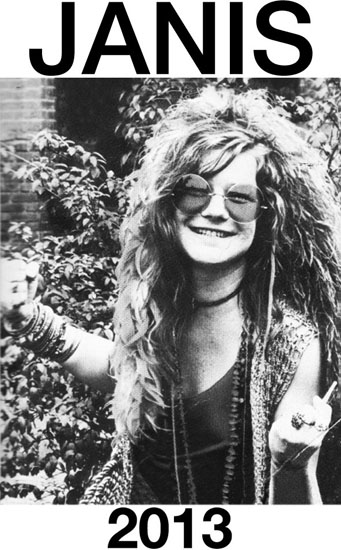From Carrie Miller…
Janis Joplin was not only a member of the infamous ‘27 club’ in rock n roll, she has been one of the biggest musical inspirations to feminists since she gave us a piece of her heart in the late 60s. Janis might refer to the solo iconic figure but Janis the art project is bigger than one woman. In fact it’s a project focusing specifically on female art practice. It will take a critical approach to this practice and think through the problems of how women’s art making can be conceptualised and viewed.
The first iteration of the project includes some pretty impressive female voices from the contemporary art world including Sarah Contos, Kelly Doley, Hannah Furmage, Zoe Robertson, Marian Tubbs and Justene Williams. The exhibition will also include a publication featuring the writings of Diana Smith and Amanda Rowell.
The project’s aims align with the persona of Joplin who has taken on a feminist aura for her distinct female voice. As Rowell writes about the singer in an accompanying essay: “[I] always respected her for her singularity, for how she knew and trusted her own voice.”
We’ve come a long way, baby but this exhibition looks at how much further we could go.
Until February 24
Alaska Projects, Kings Cross.
Pic: Janis Joplin, taken from the cover of The Obsessions and Passions of Janis Joplin by Ellis Amburn, Warner Books 1993. Image: David Gahr.



Crikey, what a long shot! This type of airy blurb typifies a trendy feminism that is here co-opting the dazzling brief flash that was Janis Joplin’s ‘s muddled life. Joplin was a grand original with a heavenly voice who was also a tragically disturbed, alcohol/drug-addled victim of an abusive, bullying poor-fit suburban Texan background and the revolutionary rock ‘n roll era she found herself in. Her manic career was way too hectically busy battling her own addictions and the chaotic, male-dominated music scenes of the 60’s and 70’s in America to reflectively summon up any liberating personal insights, let alone depict herself as a poster-girl for women’s liberation. Her ‘feminism’ more or less solely consisted in raging at endless romantic disappointments and shabby treatment by her lovers, meanwhile having little sense of her own responsibility for her relationship failures (probably her most explicit statement about the then unequal relations between men and women was expressed in Move Over). Her inspiration was aesthetic and musical, never intentionally political. It was the emerging women’s movement of the ’60’s & 70’s (inspired in turn by earlier political legacies) that in fact made it possible for women to find their voices in the arts and in music, and the hotchpotch of American freedom movements actually benefitted Joplin, despite its inherent inequalities and her lamentations.
While it’s a truism that liberation movements spring from the rage of the oppressed, to assert that ‘…The project’s aims align with the persona of Joplin who has taken on a feminist aura for her distinctive female voice” is to engage in glib metaphorization of a beautiful, inspiring real voice into a feminist one; the truth is that Joplin was literally female, blessed with literally an marvellous, distinctive voice that was her instrument and emotional vehicle – as it was for so many other great singers – for expressing her troubled soul, period. That she inspired other female vocalists and expressed the feelings of millions when she sang does not give her feminist status, just as her sources of inspiration – such as Bessie Smith and Mar Rainey – were not feminists but gifted survivors of their own times. No matter how significant may be Joplin’s musical legacy, this sort of hagiography distorts the truth and merely exemplifies a vacuous pseudo-feminism inclined to parasitically transform female ‘victims’ of the past into shining exemplars of women’s liberation. Joplin was a talented narcissist who would not have been able to raise her head from the bottle or needle long enough to identify with it before dying too young of an overdose. It is a distortion of feminist history to elevate her tragic life to feminist martyrdom (which is what is implied if you follow the logic), and I’m sure Janis herself would have cackled most heartily over any such attempt.